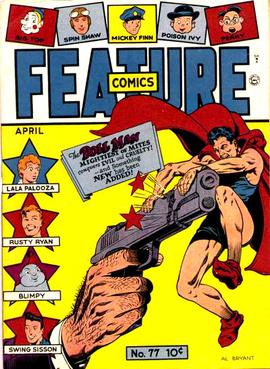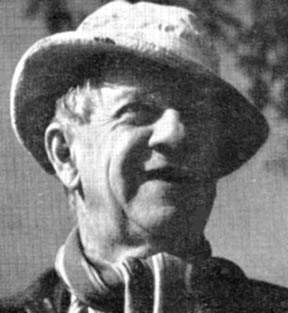Related Research Articles

Boob McNutt was a comic strip by Rube Goldberg which ran from June 9, 1918 to September 23, 1934. It was syndicated by the McNaught Syndicate from 1922 until the end of its run.
United Feature Syndicate, Inc. (UFS) is a large American editorial column and comic strip newspaper syndication service based in the United States and established in 1919. Originally part of E. W. Scripps Company, it was part of United Media from 1978 to 2011, and is now a division of Andrews McMeel Syndication. United Features has syndicated many notable comic strips, including Peanuts, Garfield, Li'l Abner, Dilbert, Nancy, and Marmaduke.

Everett M. Arnold, also known as Busy Arnold, was an American publisher and an early comic-book entrepreneur whose company Quality Comics published during the 1930s and 1940s period fans and historians call the Golden Age of Comic Books. He was also instrumental in the publishing arrangement that led to Will Eisner's newspaper Sunday-supplement comics series The Spirit.

Feature Comics, originally Feature Funnies, was an American comic book anthology series published by Quality Comics from 1939 until 1950, that featured short stories in the humor genre and later the superhero genre.

Gordon G. Rogers, better known as Boody Rogers, was an American comic strip and comic book cartoonist who created the superhero parody Sparky Watts.

Columbia Comics Corporation was a comic book publisher active in the 1940s whose best-known title was Big Shot Comics. Comics creators who worked for Columbia included Fred Guardineer, on Marvelo, the Monarch of Magicians; and Ogden Whitney and Gardner Fox on Skyman.

Crack Comics is an anthology comic book series published by Quality Comics during the Golden Age of Comic Books. It featured such characters as The Clock, Black Condor, Captain Triumph, Alias the Spider, Madame Fatal, Jane Arden, Molly the Model, and Red Torpedo. The title "crack" referred to "being at the top of one's form", like a "crack sharpshooter".

The McNaught Syndicate was an American newspaper syndicate founded in 1922. It was established by Virgil Venice McNitt and Charles V. McAdam. Its best known contents were the columns by Will Rogers and O. O. McIntyre, the Dear Abby letters section and comic strips, including Joe Palooka and Heathcliff. It folded in September 1989.

Clare Victor Dwiggins was an American cartoonist who signed his work Dwig. Dwiggins created a number of comic strips and single-panel cartoons for various American newspapers and newspaper syndicates from 1897 until 1945, including his best-known strip, the long-running School Days.
Allan Holtz is an American comic strip historian who researches and writes about newspaper comics for his Stripper's Guide blog, launched in 2005. His research encompasses some 7,000 American comic strips and newspaper panels. In addition to his contributions to Hogan's Alley and other publications about vintage comic strips, he is the author of American Newspaper Comics: An Encyclopedic Reference Guide (2012). He is a resident of Tavares, Florida.
Frank M. Borth III was an American comic book artist.

McClure Newspaper Syndicate, the first American newspaper syndicate, introduced many American and British writers to the masses. Launched in 1884 by publisher Samuel S. McClure, it was the first successful company of its kind. It turned the marketing of comic strips, columns, book serials and other editorial matter into a large industry, and a century later, 300 syndicates were distributing 10,000 features with combined sales of $100 million a year.
The Bell Syndicate, launched in 1916 by editor-publisher John Neville Wheeler, was an American syndicate that distributed columns, fiction, feature articles and comic strips to newspapers for decades. It was located in New York City at 247 West 43rd Street and later at 229 West 43rd Street. It also reprinted comic strips in book form.
The Register and Tribune Syndicate was a syndication service based in Des Moines, Iowa, that operated from 1922 to 1986, when it was acquired by King Features to become the Cowles Syndicate affiliate. At its peak, the Register and Tribune Syndicate offered newspapers some 60 to 75 features, including editorial cartoonist Herblock, comic strips, and commentaries by David Horowitz, Stanley Karnow, and others.
The Public Ledger Syndicate was a syndication company operated by the Philadelphia Public Ledger that was in business from 1915 to circa 1950. The Ledger Syndicate distributed comic strips, panels, and columns to the United States and the United Kingdom, Ireland, Canada, Sweden, New Zealand, and Australia. The syndicate also distributed material from the Curtis Publishing Company's other publications, including The Saturday Evening Post, Ladies' Home Journal, and The Country Gentleman.
The New York Herald Tribune Syndicate was the syndication service of the New York Herald Tribune. Syndicating comic strips and newspaper columns, it operated from c. 1914 to 1966. The syndicate's most notable strips were Mr. and Mrs., Our Bill, Penny, Miss Peach, and B.C. Syndicated columns included Walter Lippmann's Today and Tomorrow, Weare Holbrook's Soundings, George Fielding Eliot's military affairs column, and John Crosby's radio and television column. Irita Bradford Van Doren was book review editor for a time.
General Features Corporation was a syndication service that operated from 1937 to 1974. It was founded by S. George Little and billed itself in the early 1950 as "America's Leading Independent Syndicate." By 1967, General Features distributed 80 columns, comic strips, and editorial features.
Associated Newspapers, Inc. was a print syndication service of columns and comic strips that was in operation from 1912 to c. 1966. The syndicate was originally a cooperative of four newspapers: The New York Globe, the Chicago Daily News, The Boston Globe, and the Philadelphia Bulletin. Associated Newspapers was led by Henry Herbert McClure (1874-1938), a cousin of S. S. McClure, founder of the McClure Syndicate, the first American newspaper syndicate. In 1930, Associated Newspapers was acquired by and became a subsidiary of the Bell Syndicate. The syndicate's most successful, long-running strip was Gladys Parker's Mopsy.
The New York World was one of the first newspapers to publish comic strips, starting around 1890, and contributed greatly to the development of the American comic strip. Notable strips that originated with the World included Richard F. Outcault's Hogan's Alley, Rudolph Dirks' The Captain and the Kids, Denys Wortman's Everyday Movies, Fritzi Ritz, Gus Mager's Hawkshaw the Detective, Victor Forsythe's Joe Jinks, and Robert Moore Brinkerhoff's Little Mary Mixup.
Editors Press Service was a print syndication service of columns and comic strips that was in operation from 1933 to 2010. It was notable for being the first U.S. company to actively syndicate material internationally. Despite surviving for more than seven decades, EPS was never a large operation, characterized by comic strip historian Allan Holtz as a "hole-in-the-wall outfit."
References
- ↑ Goulart, Ron. Comic Book Culture: An Illustrated History (Collectors Press, Inc., 2000), p. 85.
- ↑ Holtz, Allan. "Obscurity of the Day: Ken Stuart," Stripper's Guide (Oct. 10, 2018).
- ↑ Markstein, Don. "Lala Palooza," Toonpedia. Accessed Jan. 5, 2018.
- ↑ Whelan entry, Who's Who of American Comic Book Artists, 1928–1999. Accessed Jan. 5, 2018.
- ↑ "Edgar Wheelan (1888 - 1966, USA)," Lambiek's Comiclopedia. Accessed Jan. 5, 2018.
- ↑ Steranko, Jim (1972). The Steranko History of Comics 2. Reading, Pennsylvania: Supergraphics. p. 92. ISBN 0-517-50188-0.
- ↑ "Quality Comic Group: A Brief History". Connecticut Historical Society. Archived from the original on September 27, 2007.
- ↑ Booker, M. Keith, editor. "Big Shot Comics," in Comics Through Time: A History of Icons, Idols, and Ideas (ABC-CLIO, 2014), p. 36.
- ↑ "Frank Borth". lambiek.net. Retrieved 7 April 2018.
- 1 2 Borth entry, Who's Who of American Comic Book Artists, 1928–1999. Accessed Jan. 5, 2018.
- ↑ Jay, Alex. "Ink-Slinger Profiles by Alex Jay: Johnny Devlin," Stripper's Guide (June 11, 2018).
- ↑ Markstein, Don. "Sparky Watts," Toonpedia. Accessed Jan. 5, 2018.